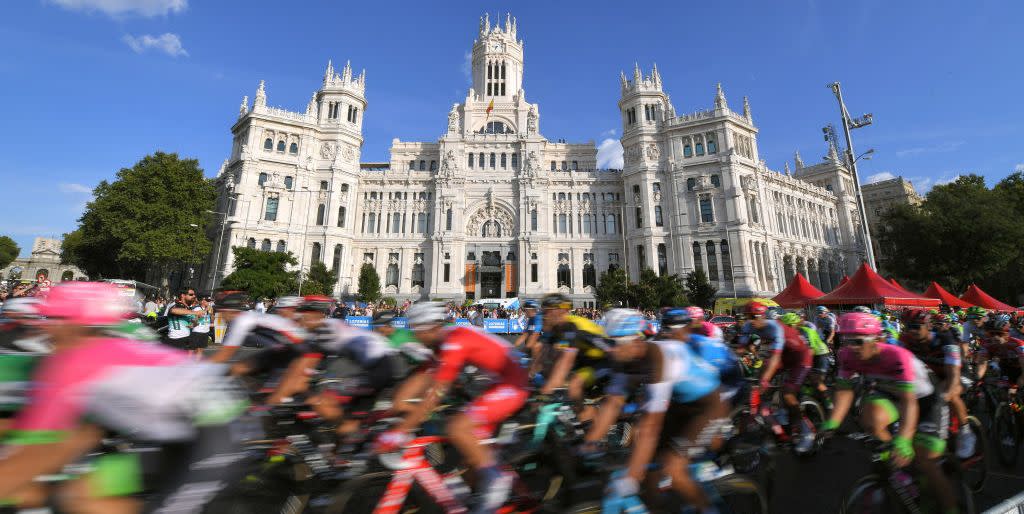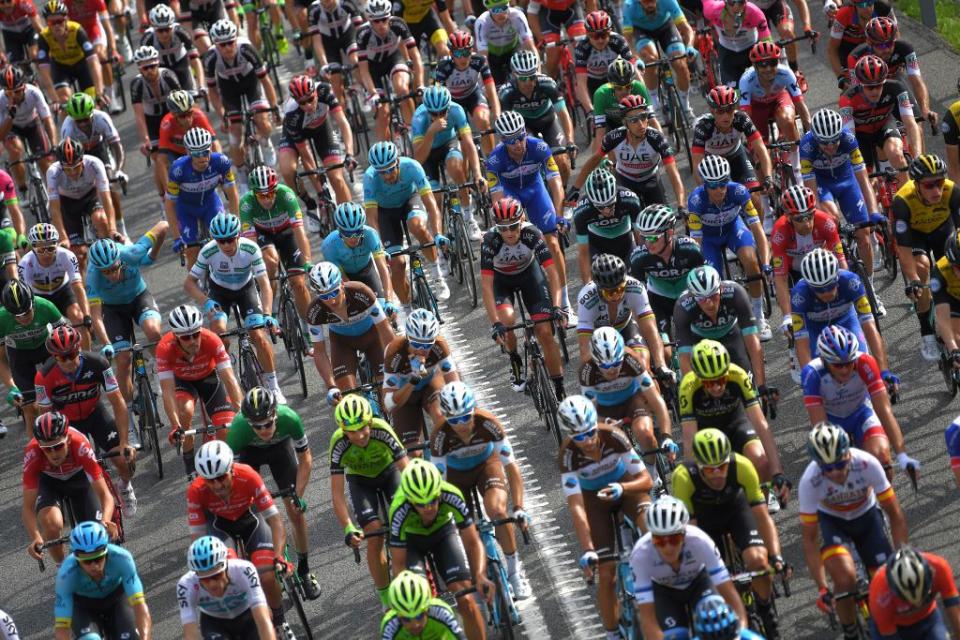Get Ready for a Hard, Competitive, and Incredibly Mountainous Vuelta a España

The 2019 Vuelta a España starts on Saturday, August 24, in the province of Alicante, Spain. And despite the Tour de France ending less than a month ago, we couldn’t be more excited.
We love the Vuelta. As the last of cycling’s three Grand Tours on the calendar, it always serves as a final chance for riders hoping to end their seasons on a high note or make up for disappointing performances earlier in the year. It’s also a great way to prepare for the World Championships a few weeks later, so the start list is always filled with stage racers and one-day stars. Last but not least, it’s the season’s most mountainous Grand Tour. This year’s race has eight uphill finishes, including some of the toughest climbs on the Iberian peninsula.
Here’s everything you should know about the Spanish stage race, along with a rundown of top contenders for the maillot roja—the red jersey awarded to the Vuelta’s overall leader.
When
The 2019 Vuelta a España begins on Saturday, August 24, and finishes on Sunday, September 15.
Route
This year’s race takes place over 21 stages, plus two rest days, and covers 3,272.2K (2,028 miles). It includes one team time trial, one individual time trial, and eight uphill finishes—five of which are new to the race. The course also allows at least six days for the sprinters.

Things kick off with a team time trial around the city of Torrevieja and its famous salt lakes, the first of three stages on the warm, sunny Costa Blanca. The peloton then heads north along the Mediterranean coast through Valencia, Teruel, Castellón, Tarragona, and ultimately Barcelona, with several uphill finishes that will begin to shape the General Classification. The first rest day comes after a short, mountainous stage in the small country of Andorra, where only the best climbers will challenge for the win.
The second week opens with a 36K individual time trial finishing in Pau, France (which hosted an ITT during the Tour de France). Then the race heads west across Spain’s northern coast, with a series of difficult stages ranging from punchy to incredibly mountainous. This is by far the hardest week of the Vuelta, and perhaps only two or three overall favorites will remain in contention by the end. Two hard mountain stages will ultimately decide the outcome during the final week, before the race ends with a flat stage in Madrid.

How to Watch
If you bought NBC Sports Gold’s Cycling Pass ($55) before the Tour de France, you’ll be happy to hear that it comes with access to the Vuelta as well. You can watch the race live and on demand via the NBC Sports website, the NBC Sports app for IOS and Android, and the NBC Sports app for Chromecast, Roku, Apple TV, and Amazon FireTV. (If you didn’t subscribe in July, don’t worry. Subscriptions are still available, but will expire just before next year’s Tour de France.)
The entire Vuelta is also available live and on demand via FloBikes, including daily recaps with behind-the-scenes footage, interviews, and previews of upcoming stages. Anyone with a FloBikes Pro subscription ($150 a year or $30 a month) can stream the race via FloBikes.com, the FloSports app for IOS, and the FloSports app for Roku, Apple TV, and Amazon FireTV.
Cable subscribers can also catch the race on NBC’s Olympic Channel. TV coverage begins on August 24, so check your local listings.
What Happened Last Year
After losing the 2018 Giro d’Italia despite leading the race for 13 stages, Simon Yates came through at the Vuelta, taking the first Grand Tour victory of his career (and the first in his Mitchelton–Scott team’s history). After wearing the red jersey briefly during the second week, Yates seized it for good after winning Stage 14. His advantage was narrow at first, but his second- and third-place finishes on stages 19 and 20 sealed the deal for the then-26-year-old, who was clearly the strongest and most consistent rider over the mountainous three weeks.

Riders to Watch
This section has been updated to reflect individual rider announcements and changes in team rosters.
Yates, who won two stages at the Tour de France, won’t return to the Vuelta to defend his title this year. Mitchelton–Scott will instead ride for Esteban Chavez, a Colombian climber who finished third at the race in 2016 and could prove to be the team’s strongest rider in Yates’s absence.
With the champion out, we expect the biggest challenge for the win to come from Astana’s Miguel Ángel López, who finished third last year. Movistar’s Richard Carapaz, who won the Giro d’Italia in May, won’t start due to a shoulder injury, but his team will bring a squad with multiple leaders, including Alejandro Valverde and Nairo Quintana. It’ll be interesting to see if Moivstar can ride as cohesively as it did in winning the Giro, or as confusingly as it did in losing the Tour de France.
Other contenders include Jumbo–Visma’s Primož Roglič, who finished fourth in last year’s Tour de France and third at the most recent Giro, as well as EF Education First’s Rigoberto Urán, who placed seventh in this year’s Tour but seemed to end with a little left in his tank. There’s also UAE’s Fabio Aru, who won the Vuelta in 2015 and looks to have nearly returned to form, and his teammate Tadej Pogačar, who won the Tour of California and is considered one of the biggest young talents in the sport.
Nine Americans are slated to start: CCC’s Will Barta; EF Education First’s Lawson Craddock, Logan Owen, and Tejay van Garderen; Jumbo–Visma’s Sepp Kuss and Neilson Powless; Trek–Segafredo’s Peter Stetina and Kiel Reijnen; and Dimension Data’s Ben King, who won two stages in last year’s edition.
You Might Also Like

